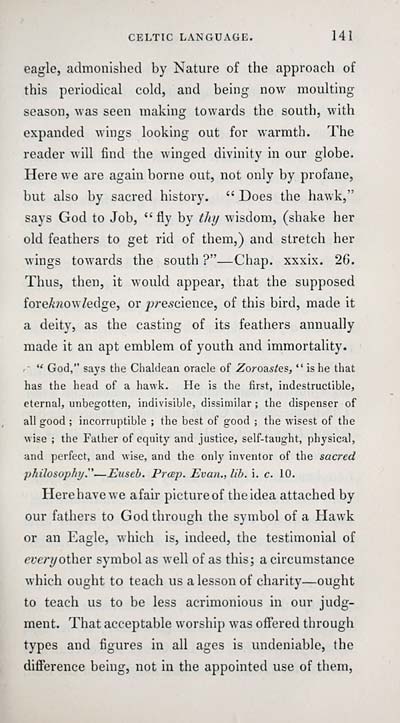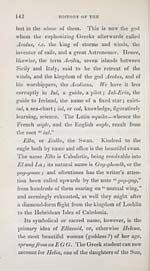Download files
Complete book:
Individual page:
Thumbnail gallery: Grid view | List view

CELTIC LANGUAGE. 141
eagle, admonislied by Nature of the approach of
this periodical cold, and being now moulting
season, was seen making towards the south, with
expanded wings looking out for warmth. The
reader wiU fìnd the winged divinity in our globe.
Here we are again borne out, not only by profane,
but also by sacred history. " Does the hawk,"
says God to Job, " fly by thy wisdom, (shake her
old feathers to get rid of them,) and stretch her
wings towards the south ?" — Chap. xxxix. 26.
Thus, then, it would appear, that the supposed
foreAnow/edge, or /(/-e^cience, of this bird, made it
a deity, as the casting of its feathers annually
made it an apt emblem of youth and immortahty.
" God," says the Chaldean oracle of Zoroas^es, " is he that
has the head of a hawk. He is the first, indestructible,
eternal, unbegotten, indivisible, dissimilar ; the dispenser of
all good ; incorruptible ; the best of good ; the vvisest of the
wise ; the Falher of equity and justice, self-taught, physical,
and perfect, and wise, and the only inventor of the sacred
philosuphij.'' — Euseb. Prcep. Evan., lib. i. c. 10.
Herehave we afair pictureof theidea attached by
our fathers to Godthrough the synibol of a Hawk
or an Eagle, v/hich is, indeed, the testimonial of
evenjoÙiQV symbol as well of as this; a circumstance
which ought to teach us a lesson of charity — ought
to teach us to be less acriraonious in our judg-
ment. That acceptable vvorship was offered through
types and figures in all ages is undeniable, the
difference being, not in the appointed use of them.
eagle, admonislied by Nature of the approach of
this periodical cold, and being now moulting
season, was seen making towards the south, with
expanded wings looking out for warmth. The
reader wiU fìnd the winged divinity in our globe.
Here we are again borne out, not only by profane,
but also by sacred history. " Does the hawk,"
says God to Job, " fly by thy wisdom, (shake her
old feathers to get rid of them,) and stretch her
wings towards the south ?" — Chap. xxxix. 26.
Thus, then, it would appear, that the supposed
foreAnow/edge, or /(/-e^cience, of this bird, made it
a deity, as the casting of its feathers annually
made it an apt emblem of youth and immortahty.
" God," says the Chaldean oracle of Zoroas^es, " is he that
has the head of a hawk. He is the first, indestructible,
eternal, unbegotten, indivisible, dissimilar ; the dispenser of
all good ; incorruptible ; the best of good ; the vvisest of the
wise ; the Falher of equity and justice, self-taught, physical,
and perfect, and wise, and the only inventor of the sacred
philosuphij.'' — Euseb. Prcep. Evan., lib. i. c. 10.
Herehave we afair pictureof theidea attached by
our fathers to Godthrough the synibol of a Hawk
or an Eagle, v/hich is, indeed, the testimonial of
evenjoÙiQV symbol as well of as this; a circumstance
which ought to teach us a lesson of charity — ought
to teach us to be less acriraonious in our judg-
ment. That acceptable vvorship was offered through
types and figures in all ages is undeniable, the
difference being, not in the appointed use of them.
Set display mode to: Large image | Transcription
Images and transcriptions on this page, including medium image downloads, may be used under the Creative Commons Attribution 4.0 International Licence unless otherwise stated. ![]()
| Early Gaelic Book Collections > Hew Morrison Collection > Adhamh agus Eubh, no Craobh Sheanachais nan Gàël > (271) |
|---|
| Permanent URL | https://digital.nls.uk/76900023 |
|---|
| Description | A selection of items from a collection of 320 volumes and 30 pamphlets of literary and religious works in Scottish Gaelic. From the personal library of Hew Morrison, the first City Librarian of Edinburgh. |
|---|
| Description | Selected items from five 'Special and Named Printed Collections'. Includes books in Gaelic and other Celtic languages, works about the Gaels, their languages, literature, culture and history. |
|---|

